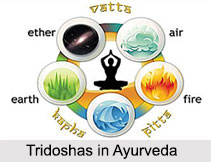 Diseases in Ayurvedaare the state of body and mind in which a person experiences discomfort, pain and injury. The fundamental cause of disease is the imbalance of the Tridoshas – Vata, Pitta and Kapha. When the three doshasare balanced, the body experiences ‘Health’ and the state of imbalance or disequilibrium is ‘Disease’ or ‘Vyadhi’ in Sanskrit. The imbalance may be due to an increase or decrease in one, two or all the three doshas. The individual is out of harmony both internally and with relation to the environment and experiences unpleasant sensations and misery in some form.
Diseases in Ayurvedaare the state of body and mind in which a person experiences discomfort, pain and injury. The fundamental cause of disease is the imbalance of the Tridoshas – Vata, Pitta and Kapha. When the three doshasare balanced, the body experiences ‘Health’ and the state of imbalance or disequilibrium is ‘Disease’ or ‘Vyadhi’ in Sanskrit. The imbalance may be due to an increase or decrease in one, two or all the three doshas. The individual is out of harmony both internally and with relation to the environment and experiences unpleasant sensations and misery in some form.Ayurvedic Concept of Disease
The Ayurvedic concept of disease explains pathological condition in terms of doshas, dhatus and malas. The Ayurvedic concept of disease defines two terms, Vikruti and Prakruti. Vikruti is the abnormal or diseased condition of the body while Prakruti refers to the normal physiological and mental state.
Causative Factors of a Disease According to Ashtanga Ayurveda, the causative factors of a disease are an imbalance in any or more of the Tridoshas, the seven dhatus, agni and the three malas. The imbalance may be caused by the following conditions: Asatmendriyarth Samyog, Aama, Pradnyaparadha and Parinama.

For more, visit he link below: